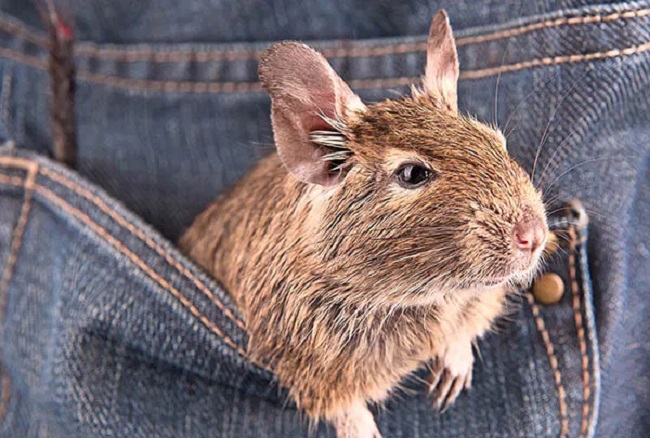
The most important signs of sickness in pocket pets are loss of appetite, difficulty breathing, diarrhea, and self-isolation, that is, separating themselves from the rest of your pet colony. If your gerbil, hamster, rat, or other pocket pet exhibits those symptoms, contact your local small mammal veterinarian and always consult with your veterinarian before you administer any medication to your pocket pet. Respiratory problems are particularly common in rats and other pocket pets. Remember that your pocket pet’s sense of smell is one of his most important links to the world around him. His olfactory senses tell him if the object in front of him is his food, his enemy, his sister, or his love interest. Any sickness that affects their ability to breathe is serious.
Poor hygiene is the indirect cause of many pocket pet illnesses. Ammonia from urine can build up in unclean cages and cause respiratory tract damage that may make your pet more vulnerable to infection. Take special care to make sure his surroundings are clean and dry. Wash his cage with a mild bleach solution and dry it carefully before adding fresh bedding. Some owners prefer to give their sick pets soft beddings like cotton towels or old T-shirts instead of their usual shavings. You can wrap a heating pad in a towel and place it under half of your pocket pet’s cage to keep him warm. Drape another towel over the top of the cage to control heat loss and never turn the heating pad up higher than its “low” setting. Remember to clean your pet’s cage thoroughly after he recovers.
Try not to separate your sick rat or gerbil from the rest of his colony. Unless your pocket pet is very ill, or being picked on, he will benefit from the familiar company. If he is suffering from something infectious, his cage mates will already have been exposed to the illness before you notice any symptoms. Treat them all as if they were infected, showing special care for the acutely ill. If you must remove a gerbil from his colony, be aware that his cage mates may reject him as a stranger when he recovers and is returned.
If your sick pocket pet is reluctant to eat or is showing signs of weight loss, indulge him in high-calorie foods he would relish in times of better health. You can try feeding him sweetened instant oatmeal, baby food, grits, or cooked eggs. Milk-soaked bread crusts provide extra calcium for a pet healing a broken bone. Proper hydration is also important for ailing pocket pets. You can sweeten water with a teaspoon of sugar to make it more appetizing to your pet. Be aware that diarrhea is often a sign of serious illness and can be particularly dehydrating for pocket pets. Call your veterinarian immediately if your pet’s diarrhea persists.
Make sure to only use medications recommended by a veterinarian that specializes in small mammals. Penicillin and its derivatives may be dangerous for pocket pets and other rodents that rely on the good bacteria in their digestive systems to process food normally. If you need to administer an oral medication from an oral syringe or an eyedropper, have the medicine properly measured and ready to go before you immobilize your pet. Most pocket pets can be stabilized by firmly grasping the extra skin on the back of their neck between your thumb and forefinger. Try to keep your “good” hand free (your right hand if you are right-handed) to maneuver the syringe while you hold your pet with your other hand. If this doesn’t work or seems overly stressful for your pet, try wrapping him in a towel with just his head free. In most cases you need not force the syringe into your pet’s mouth; he will lick the nub placed directly in front of his face. Watch him carefully while you feed him to make sure he swallows the whole dose.
Most humans are not susceptible to pocket pet-borne illnesses, but people with compromised immune systems should always be careful while handling their sick pets. In rare cases, salmonella and a few other bacteria can be passed from a pet to its owner. Every pet owner should be cautious about ringworm, a skin disorder caused by a fungus. Ringworm is zoonotic, which means that people can catch ringworm from infected animals, so you should wear protective latex gloves while treating this disorder. You will not catch lice or mites from your pocket pet. If your pet is showing any signs of distress or you suspect your pet is seriously ill, contact your veterinarian immediately.
Provided by Creatures Corner reader Talia Starkey
Did You Know
The word rodent comes from the Latin word `rodere’ meaning to gnaw.
An animal epidemic is called an epizootic.
Octopi have gardens.
Pets like the sound of laughter and know when you’re in pain.




Comment here